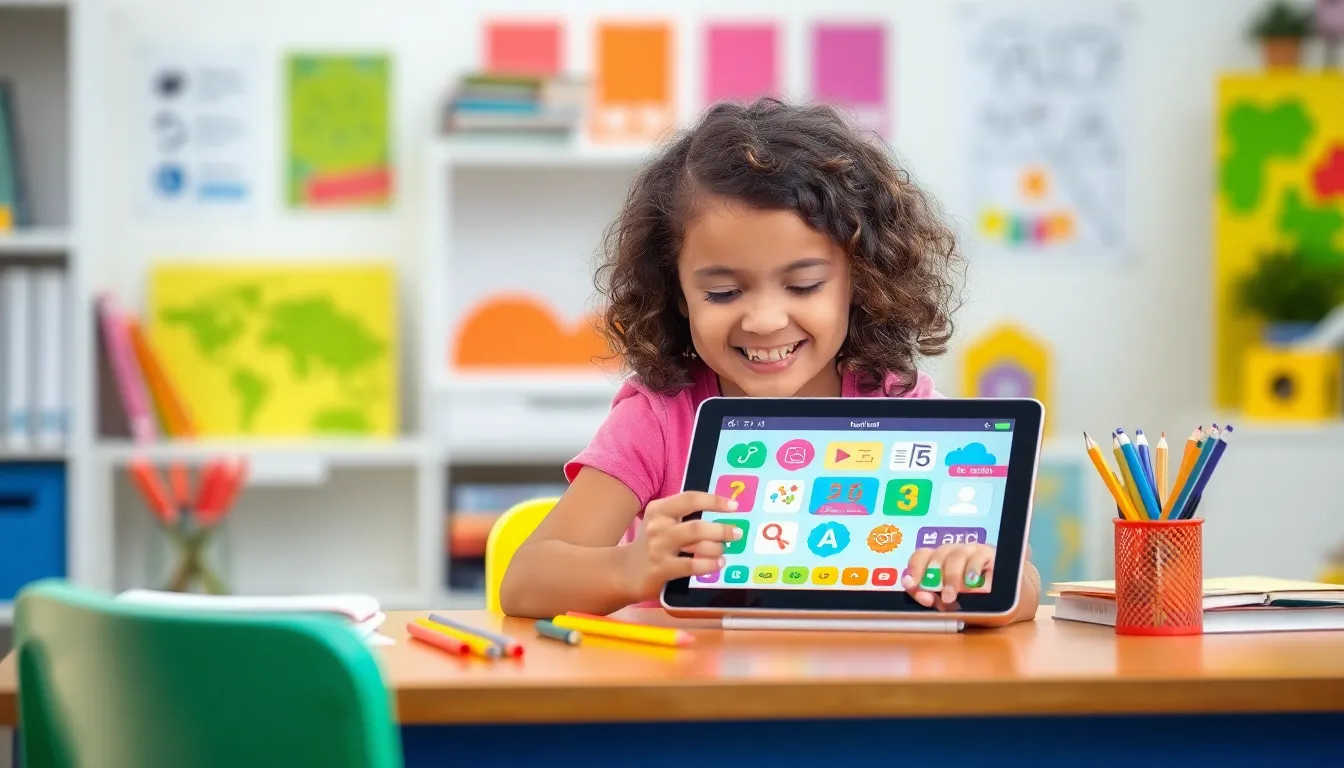In a world where distractions lurk behind every swipe, finding the right educational app can feel like searching for a needle in a digital haystack. But fear not! The best-rated educational apps are here to transform learning from a chore into an adventure. Imagine your kids mastering math while battling dragons or exploring history through interactive time travel—who knew learning could be this much fun?
Table of Contents
ToggleOverview of Best Rated Educational Apps
Navigating the multitude of educational apps can seem daunting. The best-rated educational apps stand out by turning learning into a fun experience. Engaging features capture children’s interests, making subjects like math and history more interactive.
Some apps utilize gamification elements, allowing learners to earn rewards while they progress. Leading educational apps often include adaptive learning techniques that tailor lessons to individual student needs. Popular platforms, such as Khan Academy and Duolingo, offer extensive resources for learners of all ages.
Numerous apps provide comprehensive subjects, including language arts, science, and social studies. Highlights often include videos, quizzes, and interactive simulations, enriching the learning process. Expert reviews consistently praise apps like ABCmouse and Quizlet for their user-friendly interfaces and diverse content.
Data shows that utilizing these top-rated applications can improve academic performance significantly. Statistics indicate students using educational apps regularly score higher on standardized tests. Engaging with such apps creates a more robust learning environment, enhancing retention and comprehension.
Parents appreciate these resources because they promote independent learning. Many applications offer progress tracking, allowing parents to monitor their children’s development. Top-rated educational apps frequently receive recognition for their effectiveness and adherence to educational standards.
With various options available, students can explore topics that genuinely interest them. Features such as multimedia lessons and collaborative projects enrich the overall educational experience. Identifying high-quality educational apps can lead to fruitful academic journeys for learners.
Benefits of Using Educational Apps

Educational apps offer numerous advantages that enhance the learning experience. They engage students in ways traditional methods often cannot.
Engaging Learning Experiences
Engagement increases with gamified content, transforming subjects like math and history into immersive adventures. Players can earn rewards for progress while battling dragons or traveling through time. These interactive elements capture attention and motivate children to learn. Exploration of various topics becomes enjoyable and fun, fostering a love for knowledge. Apps tailored to diverse interests help in retaining attention longer. Through captivating visuals and sound, apps make learning an exciting challenge, leading to improved retention and understanding of subjects.
Accessibility and Convenience
Accessibility remains a significant advantage of educational apps. Students can access resources anytime, whether at home or on the go. This flexibility allows for learning to fit seamlessly into busy schedules. High-quality content from platforms like Khan Academy and Duolingo is available at the fingertips of learners. Convenience extends beyond time; many apps provide updates and feedback for parents, enabling them to track progress easily. Immediate access to educational material fosters independent study habits. Educational apps significantly lower barriers, making learning available to students from various backgrounds.
Top Categories of Educational Apps
Various categories of educational apps cater to different learning needs. Each type focuses on enhancing skills through interactive and engaging methods.
Language Learning Apps
Language learning apps provide immersive experiences for users. Apps like Duolingo utilize gamification to motivate learners while introducing vocabulary and grammar through games. Users can practice speaking and listening skills with real-world scenarios. These platforms often feature progress tracking, allowing users to see their improvements over time. FluentU takes a unique approach by offering immersive videos to enhance comprehension and conversational skills. Reportedly, learners who use language apps regularly show significant improvement in proficiency and confidence.
Math and Science Apps
Math and science apps turn complex subjects into accessible experiences. For instance, Photomath allows students to visually understand math problems step-by-step. This app empowers learners to grasp concepts better and develop problem-solving skills. Science apps like Labster offer virtual lab simulations, giving students practical experience without the need for a physical lab. Research indicates that students using these educational tools often exhibit higher engagement and achievement in STEM subjects. Enhanced interactivity leads to a deeper understanding of critical concepts.
Study and Organization Apps
Study and organization apps streamline learning processes for students of all ages. Notability provides note-taking features, enabling users to organize ideas and collaborate with peers easily. Similarly, Quizlet offers flashcards and interactive study tools that cater to various learning styles. In addition to improving memorization, these apps promote effective time management skills. Many students who utilize organization apps report higher productivity and better retention of information. Enhanced structure can lead to significant academic benefits, especially during exam preparation.
Criteria for Evaluating Educational Apps
Evaluating educational apps involves specific criteria that ensure their effectiveness and engagement. Each aspect plays a role in determining an app’s potential to enhance the learning experience.
User Experience and Interface
User experience defines how easily children navigate educational apps. Intuitive designs contribute to learning without frustration. Engaging graphics draw users in, while clear instructions support independent exploration. Regular updates maintain relevance and improve functionality. Feedback loops guide users toward continued engagement. Accessibility features ensure all students, including those with disabilities, can participate. For example, screen readers and adjustable text sizes accommodate diverse learning needs.
Content Quality and Educational Value
Content quality significantly impacts the educational value of an app. High-quality materials align with educational standards and curricula. Engaging narratives make dry subjects come alive, while interactive elements reinforce understanding. Researchers find that adaptive learning techniques allow personalized learning experiences, catering to individual strengths. Comprehensive assessments track user progress and inform instruction. For instance, apps offering quizzes and gamified rewards boost motivation. Trusted educational sources enhance credibility and encourage frequent usage.
Navigating the world of educational apps can be overwhelming but the best-rated options stand out for their ability to engage and inspire learners. These apps not only make learning fun but also adapt to individual needs, fostering a love for education. With features that encourage independent study and provide valuable feedback, they create a supportive environment for academic growth.
As technology continues to evolve, incorporating these innovative tools into daily learning routines can significantly enhance students’ educational experiences. Embracing the right educational apps can lead to improved performance and a deeper understanding of various subjects. Investing in these resources is a step toward enriching the future of learning for children everywhere.








